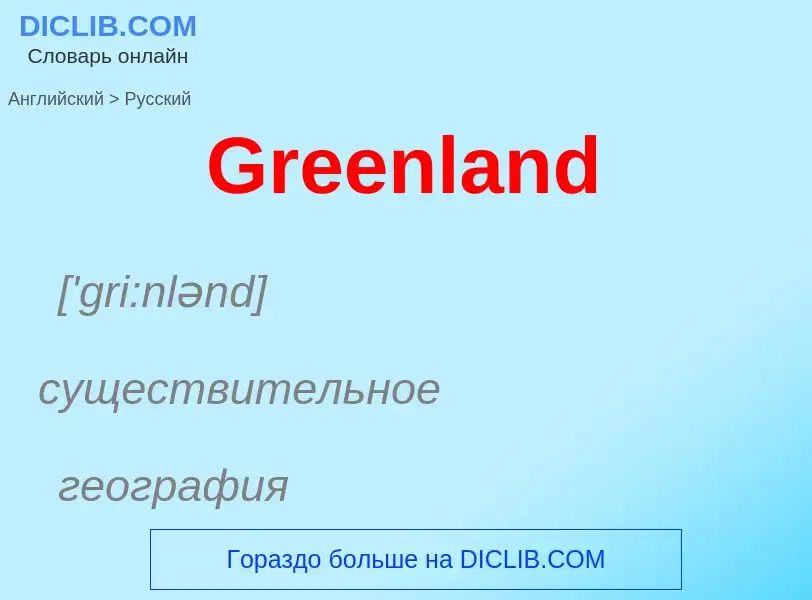Перевод и анализ слов искусственным интеллектом ChatGPT
На этой странице Вы можете получить подробный анализ слова или словосочетания, произведенный с помощью лучшей на сегодняшний день технологии искусственного интеллекта:
- как употребляется слово
- частота употребления
- используется оно чаще в устной или письменной речи
- варианты перевода слова
- примеры употребления (несколько фраз с переводом)
- этимология
Greenland - перевод на русский
['gri:nlənd]
существительное
география
о-в Гренландия
['gri:nlənd]
общая лексика
лугопастбищное угодье
сенокосное угодье
луг
пастбище
сельское хозяйство
лугопастбищные угодь
существительное
сельское хозяйство
лугопастбищные угодья
Википедия
Greenland (Greenlandic: Kalaallit Nunaat, pronounced [kalaːɬːit nʉnaːt]; Danish: Grønland, pronounced [ˈkʁɶnˌlænˀ]) is an island country in North America that is part of the Kingdom of Denmark. It lies between the Arctic and Atlantic oceans, east of the Canadian Arctic Archipelago. Greenland is the world's largest island. It is one of three countries that form the Kingdom of Denmark, the others being Denmark and the Faroe Islands; the citizens of all these countries are citizens of Denmark and of the European Union. The capital of Greenland is Nuuk.
Though a part of the continent of North America, Greenland has been politically and culturally associated with Europe (specifically Norway and Denmark, the colonial powers) for more than a millennium, beginning in 986. Greenland has been inhabited at intervals over at least the last 4,500 years by Arctic peoples whose forebears migrated there from what is now Canada. Norsemen settled the uninhabited southern part of Greenland beginning in the 10th century, having previously settled Iceland. Inuit arrived in the 13th century. Though under continuous influence of Norway and Norwegians, Greenland was not formally under the Norwegian crown until 1261. The Norse colonies disappeared in the late 15th century, after Norway was hit by the Black Death and entered a severe decline.
In the early 17th century, Dano-Norwegian explorers reached Greenland again. When Denmark and Norway separated Greenland became Danish in 1814 and was fully integrated in the Danish state in 1953 under the Constitution of Denmark, which made the people in Greenland citizens of Denmark. In 1979, Denmark granted home rule to Greenland; in 2008, Greenlanders voted for the Self-Government Act, which transferred more power from the Danish government to the local Greenlandic government. Under the new structure, Greenland has gradually assumed responsibility for a number of governmental services and areas of competence. The Danish government retains control of citizenship, monetary policy, and foreign affairs, including defence. Most residents of Greenland are Inuit. The population is concentrated mainly on the southwest coast, and the rest of the island is sparsely populated. Three-quarters of Greenland is covered by the only permanent ice sheet outside Antarctica. With a population of 56,081 (2020), Greenland is the least densely populated region in the world. 67% of its electricity production comes from renewable energy, mostly from hydropower.

![[[Sermiligaaq]]. Greenland has more than 60 settlements. [[Sermiligaaq]]. Greenland has more than 60 settlements.](https://commons.wikimedia.org/wiki/Special:FilePath/20190626 Harbor 0308 (48480740237).jpg?width=200)
![The United States has operated [[Pituffik Space Base]] since the 1950s. The United States has operated [[Pituffik Space Base]] since the 1950s.](https://commons.wikimedia.org/wiki/Special:FilePath/Aerial Picture Of Thule Air Base.jpg?width=200)
![special territories of the European Union]] (pre 31 January 2020) special territories of the European Union]] (pre 31 January 2020)](https://commons.wikimedia.org/wiki/Special:FilePath/EU OCT and OMR map en.png?width=200)
![[[Muskox]]en in Greenland [[Muskox]]en in Greenland](https://commons.wikimedia.org/wiki/Special:FilePath/Greenland-musk-ox hg.jpg?width=200)
![The [[Greenland Dog]] was brought from Siberia 1,000 years ago. The [[Greenland Dog]] was brought from Siberia 1,000 years ago.](https://commons.wikimedia.org/wiki/Special:FilePath/Greenland 377 (34999131992).jpg?width=200)
![Arctic sea ice]] is not shown. Arctic sea ice]] is not shown.](https://commons.wikimedia.org/wiki/Special:FilePath/Greenland 42.74746W 71.57394N.jpg?width=200)

![Norse]] Greenlanders records a marriage that took place in 1408 in the [[church of Hvalsey]], now the best-preserved Nordic ruins in Greenland. The married couple then travelled to Iceland, which is why the account has been preserved. Norse]] Greenlanders records a marriage that took place in 1408 in the [[church of Hvalsey]], now the best-preserved Nordic ruins in Greenland. The married couple then travelled to Iceland, which is why the account has been preserved.](https://commons.wikimedia.org/wiki/Special:FilePath/Hvalsey Church.jpg?width=200)
![Ilimmarfik]]'' university Campus in [[Nuuk]] Ilimmarfik]]'' university Campus in [[Nuuk]]](https://commons.wikimedia.org/wiki/Special:FilePath/Ilimmarfik.jpg?width=200)
![[[Tunumiit]] [[Inuit]] couple from [[Kulusuk]] [[Tunumiit]] [[Inuit]] couple from [[Kulusuk]]](https://commons.wikimedia.org/wiki/Special:FilePath/Kulusuk, Inuit couple (6822265499).jpg?width=200)
.jpg?width=200)
![Most Greenlandic villages, including [[Nanortalik]], have their own church. Most Greenlandic villages, including [[Nanortalik]], have their own church.](https://commons.wikimedia.org/wiki/Special:FilePath/Nanortalik church.jpg?width=200)
![[[Nive Nielsen]], Greenlandic singer and songwriter [[Nive Nielsen]], Greenlandic singer and songwriter](https://commons.wikimedia.org/wiki/Special:FilePath/Nive Nielsen Rudolstadt 01.jpg?width=200)
![''[[Aurora Borealis]]'', the northern lights at the sky in Greenland ''[[Aurora Borealis]]'', the northern lights at the sky in Greenland](https://commons.wikimedia.org/wiki/Special:FilePath/Northern Lights, Greenland.jpg?width=200)

![An English map of 1747, based on [[Hans Egede]]'s descriptions and misconceptions, by [[Emanuel Bowen]] An English map of 1747, based on [[Hans Egede]]'s descriptions and misconceptions, by [[Emanuel Bowen]]](https://commons.wikimedia.org/wiki/Special:FilePath/Old Greenland 1747.jpg?width=200)

![[[Pilersuisoq]] Supermarket in [[Kangerlussuaq]] [[Pilersuisoq]] Supermarket in [[Kangerlussuaq]]](https://commons.wikimedia.org/wiki/Special:FilePath/Pilersuisoq Supermarket, Kangerlussuaq (Quintin Soloviev).png?width=200)
![The [[Kingittorsuaq Runestone]] from [[Kingittorsuaq Island]] ([[Middle Ages]]) The [[Kingittorsuaq Runestone]] from [[Kingittorsuaq Island]] ([[Middle Ages]])](https://commons.wikimedia.org/wiki/Special:FilePath/Runesten fra Kingittorsuaq.jpg?width=200)
![1869 photograph of [[Greenlandic Inuit]]. 1869 photograph of [[Greenlandic Inuit]].](https://commons.wikimedia.org/wiki/Special:FilePath/Some of the intelligent inhabitants, man, boy, and girl.jpg?width=200)

